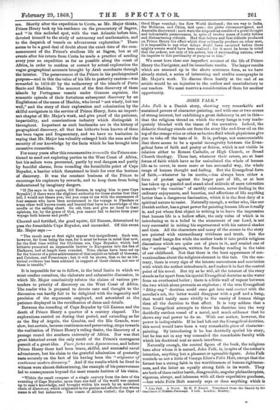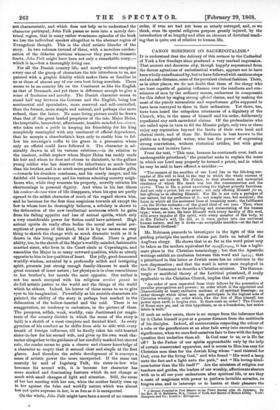JOHN FALK.* John Falk is a Danish story, showing very
remarkable and sustained powers of character-painting, and with one or two scenes of strong interest, but exhibiting a great deficiency in art in this— that the religious thread on which the story hangs is very inade- quately blended with the tissue of the narrative. Indeed, the didactic theology stands out from the story like cod-liver oil on the top of the orange wine or other seductive fluid which physicians give you to take off the taste of it. It is, perhaps, not unaccountable that there seems to be a special incongruity between the Evan- gelical form of faith and poetry or fiction, which is not visible in relation either to Roman Catholic, or High Church, or Broad Church theology. These last, whatever their errors, are at least forms of faith which have so far assimilated the whole of human life as to cover, in some more or less successful way, the whole range of human thought and feeling. But the Evangelical form of faith,—whatever be its merits,—has always been either a form of protest against the larger part of life, or at best has taken up a puzzled and stand-aloof attitude of mere toleration towards " the vanities" of earthly existence, never finding in the ordinary enjoyments, and beauties, and affections of life anything better than a dangerous fascination, which it is the first duty of a spiritual nature to resist. Naturally enough, a writer who, like our Danish author, has a great power for painting human life as it really is, and yet whose first object in writing is to leave the impression that human life is a hollow affair, the only value of which is in introducing us to a belief in the atonement of our Lord, is not very successful in mixing his supernatural with his natural shades and tints. All the characters and many of the scenes in the story are painted with extraordinary vividness and truth. But the story itself hangs fire while the author leads it into prolix religious discussions which are quite out of place in it, and remind one of the " serious" chapters, written for Sunday reading in the tales of our childhood. Not that there is the least appearance of con- ventionalism about the religious element in this tale. On the con- trary, there is every sign of the intense earnestness and conviction with which the author introduces it, and makes it in fact the central point of his novel. But try as he will, all the interest of the story stands as far apart from his special Evangelical doctrine as the water from an overheated boiler ; there is a little wall of vapour between the two which alone prevents an explosion ; if the true Evangelical " filthy-rag " doctrine could once get into real contact with the novelist's art, the latter would disappear with a puff and a bang, that would testify more vividly to the vanity of human things than all the doctrine to that effect. It is very seldom that a true Evangelical attempts to throw his doctrine into the very decidedly earthen vessel of a novel, and much seldomer that he shows any real power to do so. With our author, however, the power is indisputable. If he had left out the Evangelical doctrine, this novel would have been a very remarkable piece of character- painting. By introducing it he has decidedly spoiled his story, but he has not in any way concealed the remarkable faculty with which his doctrinal zeal so much interferes.
Naturally enough, the central figure of the book, the religious hero after whom it is named, John Falk, is, in spite of the author's intention, anything but a pleasant or agreeable figure. John Falk reminds us not a little of George Eliot's Felix Holt, except that the former has a strong faith in the worthlessness of human righteous- ness, and the latter an equally strong faith in its worth. They are both of them rather harsh, disagreeable, angular philanthropists, vigorous, abrupt, and inhuman with all their superlative goodness, —but while Felix Holt scarcely says or does anything which is
• John Falk. A Novel. By H. F. Ewald. Translated from the Danish by the translator of Noddebo Parsonage. 3 vols. London : Bentley. not characteristic, and which does not help us to understand the character portrayed, John Falk passes so soon into a merely doc- trinal region, that in many rather wearisome episodes of the book we lose the individual speaker altogether in the abstract region of Evangelical thought. This is the chief artistic blunder of the story. In two volumes instead of three, with a merciless conden- sation of the didactic portions whenever they pass the dramatic limits, John Falk might have been not only a remarkable story,— which it is,—but a thoroughly living one.
For all the Danish country life, and nearly without exception every one of the group of characters the tale introduces to us, are painted with a graphic fidelity which makes them as familiar to us as those of almost any of our own best living novelists. There seems to be no country life on the Continent so like the English as that of Denmark, and yet there is difference enough to give a sense of freshness and novelty. The Danish character seems to stand half way between the German and the English, being less sentimental and speculative, more reserved and self-controlled, than the former, more simple and natural, and perhaps also more refined, than the latter. No more living picture could be drawn than that of the great landed proprietor of the tale, Major Heins, the hospitable, benevolent, affectionate, humble-minded bon-vivant, wbo takes such a pride in keeping his friendship for his king completely unmingled with any sentiment of official dependence, that he accepts a chamberlain's keys only to enable him to fol- low his sovereign's coffin to the grave in a procession where only an official could have followed it. The character is ad- mirably drawn in all its various relations,—in its relation to the insolent, selfish nephew whom Major Heins has rashly made his heir and whom he does not choose to disinherit, to the gallant young soldier who has deserved the inheritance so much better than his brother, and is so much more grateful for his smaller gifts, —towards his drunken coachman, and his manly ranger, and his faithful old housekeeper, and his various admiring country neigh- bours who, while they venerate his property, secretly criticize his shortcomings in personal dignity. And when in his last illness his couleur-de-rose view of life disappears, when his eyes are partly opened to the selfish character of much of the regard shown him, and he becomes for the first time suspicious towards all except the few in whose love he thoroughly believes, a subtlety is shown in the delineation of the new intellectual acuteness which he gains from his failing appetite and loss of animal spirits, which only a very considerable power for fiction could have achieved. High animal spirits do really often bedim the moral and social per- ceptions of persons of this kind, but it is by no means an easy thing to sketch the change with as much dramatic truth as it is drawn in this living portrait of Major Heins. There is great ability, too, in the sketch of the Major's worldly-minded, fashionable married sister, who lives in the Court circle at Copenhagen, and resembles the Major in so many outward qualities, while so utterly opposite to him in her qualities of heart. Her jolly, good-humoured worldly-wisdom, actuated by a profoundly selfish and intriguing spirit, presents just strong enough family-likeness to mark the great contrast of inner nature ; her physique is in close resemblance to her brother's, her morale the most opposite. Our author is not too much occupied with his religious arriere pense'e to do full artistic justice to the world and the things of the world which he abhors. Indeed, his horror of these seems to us to give eyes to his imagination. Powerfully as his amiable characters are painted, the ability of the story is perhaps best marked in the delineation of the hollow-hearted and the cold. There is no exaggeration, no tendency to caricature, in the picture of these. The pompous, selfish, weak, worldly, vain Justitsraad (or magis- trate of the country district in which the scene of the story is laid) is a sketch of a most complete and finished kind. In every gyration of his conduct as he shifts from side to side with every breath of foreign influence, till he finally takes bis cold-hearted sister-in-law for his second wife, and gives up his own weak cha- racter altogether to the guidance of her carefully masked but shrewd rule, the reader seems to gain a clearer and clearer knowledge of a character so empty that it seemed clear and simple at the first glance. And therefore the subtle development of it conveys a sense of artistic power the more unexpected. If the same can scarcely be said of Ingeborg Falk, the sister-in-law who becomes his second wife, it is because her character has more marked and dominating features which do not change so much with small changes of light and situation. Still, the scene of her last meeting with her son, when the mother faintly rises up in her against the false and worldly nature which was almost but not quite supreme in her, is as fine as it is unexpected.
On the whole, John Falk might have been a novel of no common order, if true art had not been so utterly outraged, and, as we think, even its special religious purpose greatly injured, by the introduction of so lengthy and alien an element of doctrinal teach- ing that is quite out of relation to human life.































 Previous page
Previous page